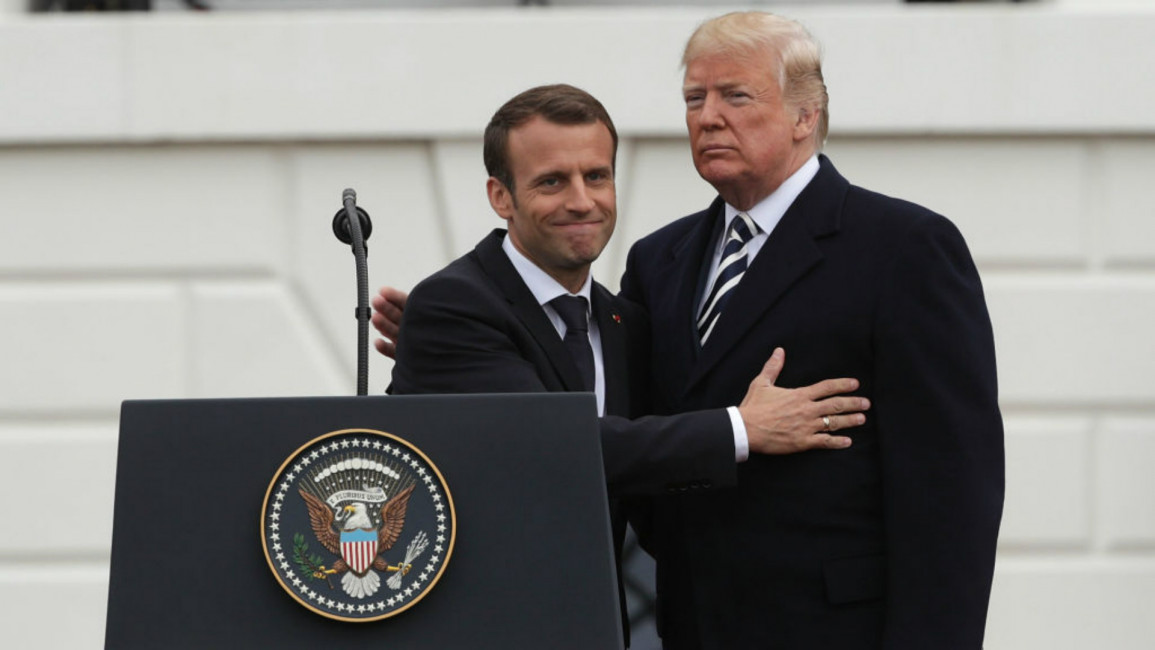Macron reiterates need to keep Iran nuclear deal amid increasing tensions
France’s leader reinforced his commitment to the Iran nuclear deal on Wednesday, noting no one wants an escalation of tensions in the region, while admitting the accord needed strengthening.
President Emmanuel Macron, who met Trump in Washington last week to try to convince him to not walk away, admitted he still did not know what decision the US leader would take.
"I don't know what the US president will decide on May 12," he said during a two-day visit to Sydney, speaking alongside Australian Prime Minister Malcolm Turnbull.
"I just want to say whatever the decision will be, we will have to prepare such a broader negotiation and a broader deal, because I think nobody wants a war in the region, and nobody wants an escalation in terms of tension in the region."
US President Donald Trump is threatening to pull out of the agreement, negotiated in 2015 between Tehran and six world powers, by a May 12 deadline for Washington to renew its support for the deal.
The agreement imposes strict restrictions on Iran's nuclear programme in return for the loosening of economic sanctions.
Trump has pilloried the agreement designed to curb Iran's nuclear programme as "insane" and "ridiculous" and called for fresh measures to counter Iran's ballistic missile programme and support for militant groups across the Middle East.
Macron, who admitted in Sydney that the existing deal was "not sufficient", is pushing for international talks on a potential wider accord.
Speaking in English, he said there needed to be three additional "pillars" in the agreement.
"One about the nuclear activity post 2025. Second, in order to have better control and monitoring of the ballistic activity of the Iranian regime.
"Third, in order to have a containment of the Iranian activity in the region, especially Iraq, Syria, Lebanon and Yemen."
The current deal gives Iran massive sanctions relief and the guarantee of a civilian nuclear programme in return for limiting enrichment that could produce weapons grade fuel.
 |
"On the list of the potentials for most likely live hostility around the world, the battle between Israel and Iran in Syria is at the top of the list right now," - Senior US official |  |
Macron’s remarks follow Israeli Prime Minister Binyamin Netanyahu's claims that tens of thousands of documents recently recovered by Israeli intelligence operatives in Tehran proved Iran had a secret nuclear weapons programme that it could put into action at any time.
Iran has always denied it sought a nuclear weapon, insisting its atomic programme was for civilian purposes
Macron made no comment on the Israeli claims, only that France was "very much attached to the stability of the region."
"That's why we want to work on this new negotiation in coordination with Germany and the United Kingdom," he said.
"We will work actively in order to convince everybody to have in the coming days, weeks and months such negotiation which is the only way to progress and stabilise the region.”
European leaders have pushed back vigorously against Netanyahu's claims, saying Iran has complied with the P5+1 nuclear accord signed in 2015.
But tensions between rivals Israel and Iran have continued to increase in recent weeks.
According to a report by NBC News, Israel now seems to be preparing for military action against Iran in Syria and is seeking US support.
"On the list of the potentials for most likely live hostility around the world, the battle between Israel and Iran in Syria is at the top of the list right now," one senior US official said.
On Tuesday, a senior Iranian lawmaker said that his country will retaliate against Israeli "aggression" after 26 military personnel were killed in a strike at a base in Syria.
"The aggression of the Zionist entity on our advisers in Syria guarantees us the right of response," said Alaeddin Boroujerdi, president of Iran's parliamentary foreign affairs committee.
"We will respond at the right time and place," he told a news conference in Damascus as part of a two-day visit.



